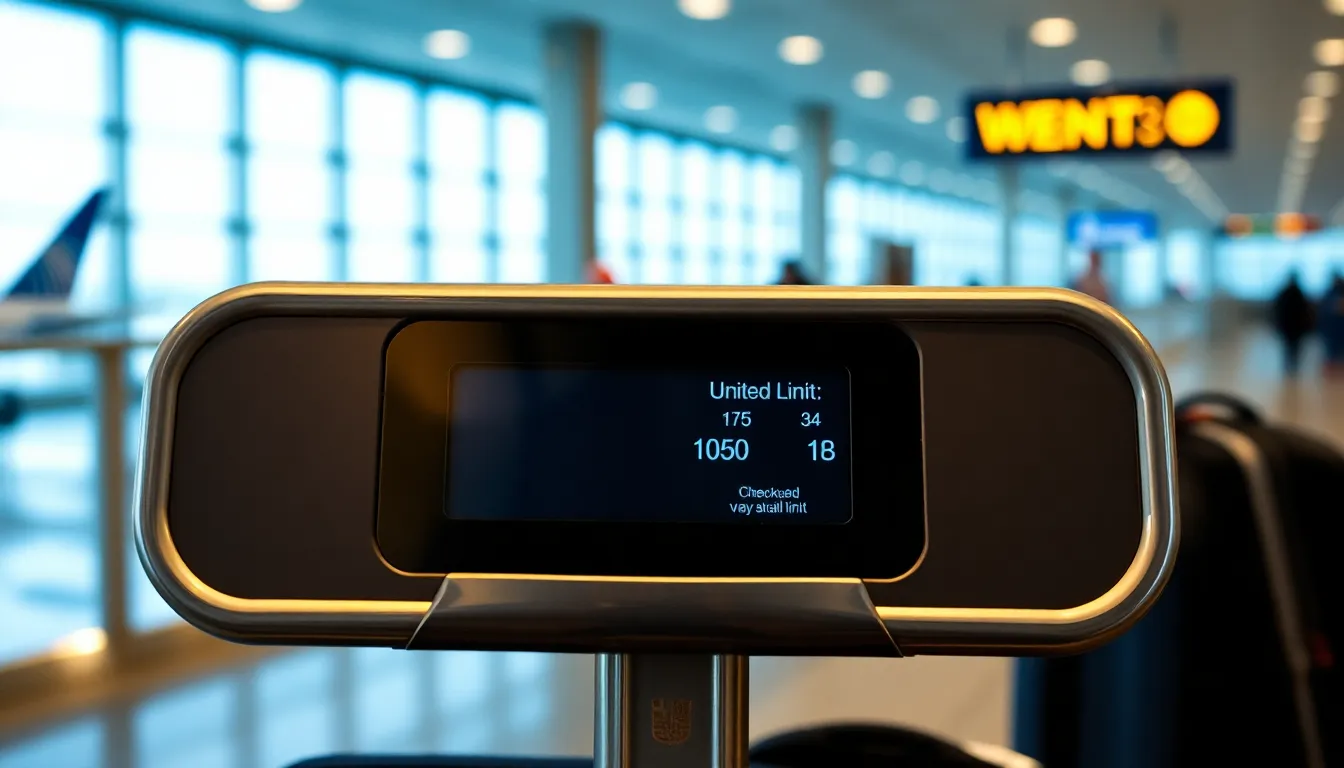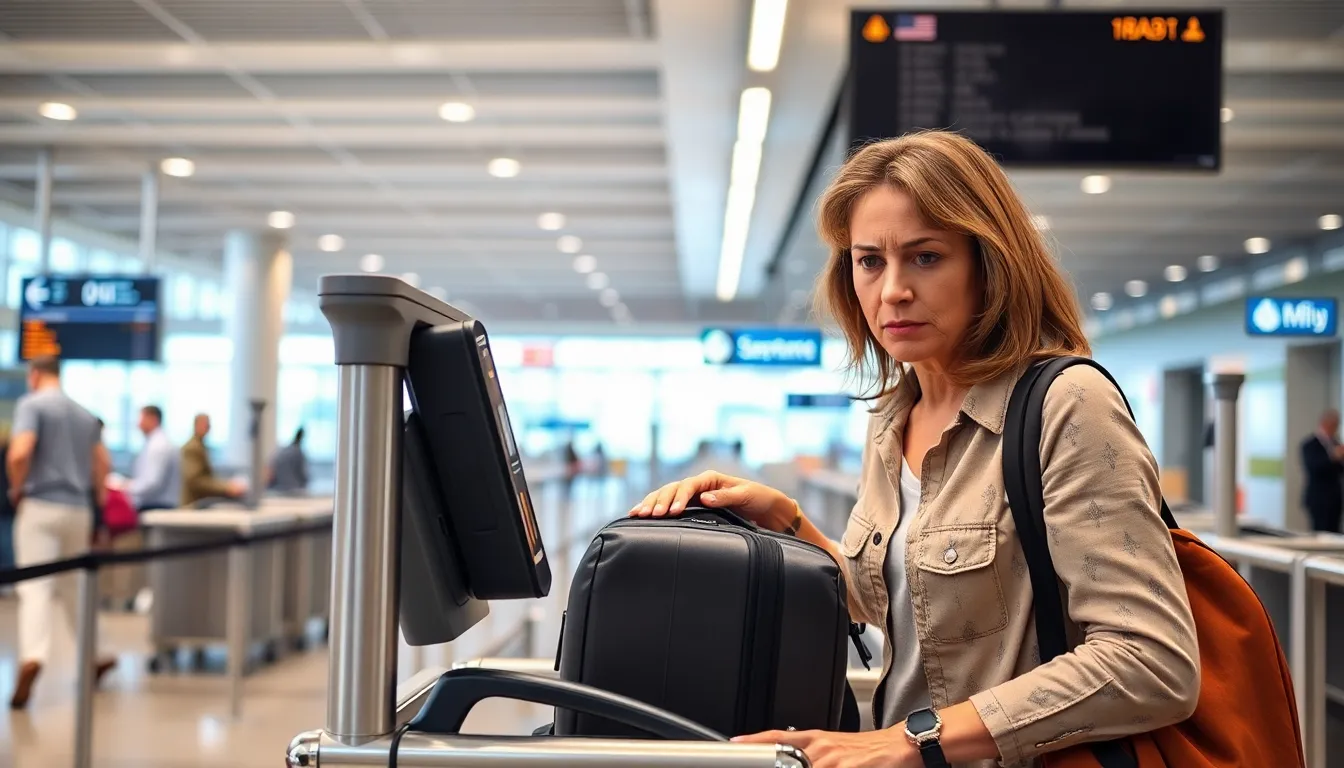Traveling can be an exhilarating experience, but it often comes with its own set of challenges, especially when it comes to packing. United Airlines, one of the major carriers in the U.S., has specific policies regarding baggage that every traveler should be aware of. Overweight baggage fees can quickly add up, turning a budget-friendly trip into an unexpected expense.
Understanding these fees is crucial for anyone planning to fly with United. By knowing the weight limits and associated costs, travelers can avoid surprises at the airport. This article dives into United Airlines’ overweight baggage fees, helping passengers navigate their travel plans with confidence.
Table of Contents
ToggleOverview of United Airlines Baggage Policies
United Airlines maintains specific guidelines regarding baggage to promote efficient travel. These policies categorize baggage into three primary types: carry-on bags, checked bags, and overweight or oversized bags.
Carry-On Baggage Policy
Travelers can bring one carry-on bag and one personal item onboard at no additional charge. Carry-on bags must not exceed 22 x 14 x 9 inches, including handles and wheels. Personal items include purses, laptops, and backpacks and should fit under the seat.
Checked Baggage Policy
Economy class passengers may check one bag for a fee, with weight limits set at 50 pounds. Business and first-class passengers typically enjoy higher allowances, permitting two checked bags without fees, up to 70 pounds each.
Overweight Baggage Fees
Bags exceeding the 50-pound limit incur fees of $100 for weights between 51 and 70 pounds and $200 for those from 71 to 100 pounds. Bags heavier than 100 pounds generally cannot be checked. For example, a traveler checking a 60-pound bag faces a $100 fee.
Oversized Baggage Fees
United charges fees for oversized baggage, defined as exceeding 62 linear inches (length + width + height). Fees for oversized bags start at $200 and can increase based on size. Passengers should measure their bags before travel to avoid unexpected costs.
Exceptions and Military Policies
United Airlines offers exemptions for active-duty military personnel under specific conditions. Military members may check additional bags free of charge, with weight limits revised accordingly.
Understanding these baggage policies enhances the traveler’s experience and aids in planning for potential fees, making for a more streamlined journey with United Airlines.
Understanding Overweight Baggage Fees

Overweight baggage fees can significantly impact travel budgets if travelers aren’t aware of the restrictions. It’s crucial to understand the definition and fee structure associated with overweight luggage when flying with United Airlines.
Definition of Overweight Baggage
Overweight baggage refers to checked bags exceeding United Airlines’ weight limits. For most travelers, the standard weight limit for checked bags is 50 pounds (23 kilograms). Bags weighing between 51 and 70 pounds (23.1 to 31.8 kilograms) qualify as overweight. Any bag exceeding 70 pounds (31.8 kilograms) is considered oversized, subject to different fees and policies.
Fee Structure for Overweight Baggage
United Airlines implements a tiered fee structure for overweight baggage.
| Weight Range | Fee |
|---|---|
| 51 – 70 pounds (23.1 – 31.8 kg) | $100 per bag |
| Over 70 pounds (31.8 kg) | Not accepted |
Prepaying overweight baggage fees during booking can eliminate line delays at the airport. Additionally, passengers can avoid fees by reorganizing belongings before check-in, ensuring bags remain within the weight limit. Understanding this fee structure is essential for managing travel costs effectively.
Tips for Avoiding Overweight Baggage Fees
Travelers can implement specific strategies to evade the excessive costs associated with overweight baggage fees on United Airlines. By applying these methods, they can enjoy a more cost-effective travel experience.
Packing Strategies
- Choose Lightweight Luggage: Select bags made from lightweight materials to minimize the weight before packing items.
- Layer Clothing: Layer clothing to maximize warmth without adding bulk. Use versatile pieces that can serve multiple purposes throughout the trip.
- Utilize Packing Cubes: Packing cubes help organize clothing and compress items, optimizing space and potentially reducing weight.
- Limit Non-Essentials: Avoid packing non-essential items like extra shoes or accessories to keep the total weight down.
- Wear Bulkier Items: Don bulky clothing like jackets or boots while traveling. This strategy reduces the weight of checked luggage.
Weighing Your Baggage
- Use a Portable Scale: Invest in a portable luggage scale to weigh bags accurately before heading to the airport.
- Check Weight Online: Some airlines allow checking the weight of bags during online check-in. Utilize this option if available.
- Reweigh Before Leaving Home: Weigh bags multiple times to ensure the weight remains within the limited allowance.
- Redistribute Weight: If a bag exceeds the weight limit, redistribute items between bags, ensuring no single bag is overweight.
- Plan for Souvenirs: Account for potential shopping or souvenirs during the trip by leaving additional space in bags.
Comparison with Competitor Airlines
United Airlines’ overweight baggage fees compare variously with those of other major airlines. Understanding these differences helps travelers make informed decisions.
Delta Air Lines
Delta Air Lines charges an overweight fee of $100 for bags weighing between 51 and 70 pounds. Like United, Delta does not accept bags over 70 pounds. Delta allows one free carry-on and one personal item, which aligns with United’s policy.
American Airlines
American Airlines imposes a similar charge of $100 for checked bags weighing 51 to 70 pounds. American also limits bags to 70 pounds, reflecting United’s restrictions. Both airlines permit one carry-on and one personal item at no additional cost.
Southwest Airlines
Southwest Airlines adopts a different approach. It allows two checked bags free of charge, with a maximum weight limit of 50 pounds. Bags exceeding this limit incur a fee of $75 for those weighing between 51 and 100 pounds. Southwest does not impose fees for overweight bags as rigorously as United.
JetBlue Airways
JetBlue charges $150 for overweight checked bags weighing between 51 and 70 pounds, similar to United Airlines. JetBlue also prohibits bags over 70 pounds, which mirrors United’s guidelines. Travelers enjoy one free carry-on and one personal item, consistent with United’s carry-on policy.
Conclusion
United Airlines maintains competitive policies regarding overweight baggage fees. While its fees align with major competitors like Delta, American, and JetBlue, Southwest stands out by allowing additional checked baggage free of charge. Comparing these fee structures helps travelers prepare adequately and potentially save on travel costs.
Customer Experiences and Reviews
Travelers often share their experiences with United Airlines’ overweight baggage fees, providing insight into the overall customer experience.
- Fee Transparency: Many customers appreciate the clarity of United’s baggage policy, highlighting that understanding fees upfront helps in budget planning. They often mention that the website offers a detailed breakdown of costs associated with overweight bags.
- Check-in Experience: Passengers frequently comment on the check-in process, noting that staff often provide accurate information about weight limits and fees. Quick resolution of overweight bag issues during check-in earns positive feedback.
- Surprise Fees: Several travelers express frustration regarding unexpected overweight baggage fees. Customers report confusion about weight limits and feel that communication could improve, especially over the phone or during check-in.
- Customer Service Interaction: Reviews indicate mixed experiences with customer service representatives. While some passengers report helpful interactions, others mention long wait times and insufficient support when addressing baggage fees.
- Advance Payment Benefits: Passengers recognize the advantages of prepaying overweight fees. Many state that it reduces stress at the airport, allowing for smoother travel.
- Packing Tips from Travelers: Travelers often share valuable packing strategies. Suggestions frequently include using lightweight luggage, factoring in extra space for souvenirs, and weighing bags to avoid extra charges.
- Comparative Experiences: Some customers compare United Airlines’ baggage fees with those of other carriers. Positive remarks about competitive pricing surface, especially when comparing services with airlines like Delta and American.
- Military Exceptions: Active-duty military personnel appreciate exemptions for extra checked bags, sharing experiences regarding how these policies alleviate financial pressure during travel.
Customer experiences and reviews provide a clear picture of interacting with United Airlines and navigating overweight baggage fees. They reflect the importance of preparation and clear communication for a positive travel experience.
Navigating United Airlines’ overweight baggage fees doesn’t have to be a daunting task. With a clear understanding of the policies and fees in place travelers can better prepare for their journeys. Implementing effective packing strategies and utilizing tools like portable scales can significantly reduce the risk of incurring additional charges.
By staying informed about the specifics of United’s baggage policies travelers can enjoy a more streamlined experience from check-in to arrival. Whether it’s comparing fees with other airlines or taking advantage of military exemptions being proactive ensures a smoother travel experience.







